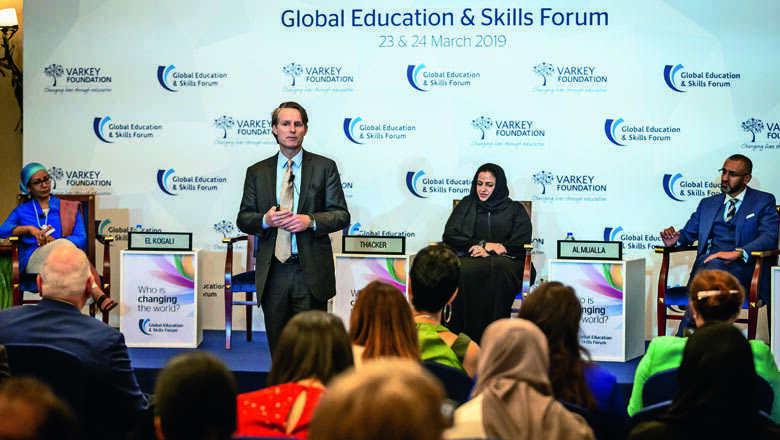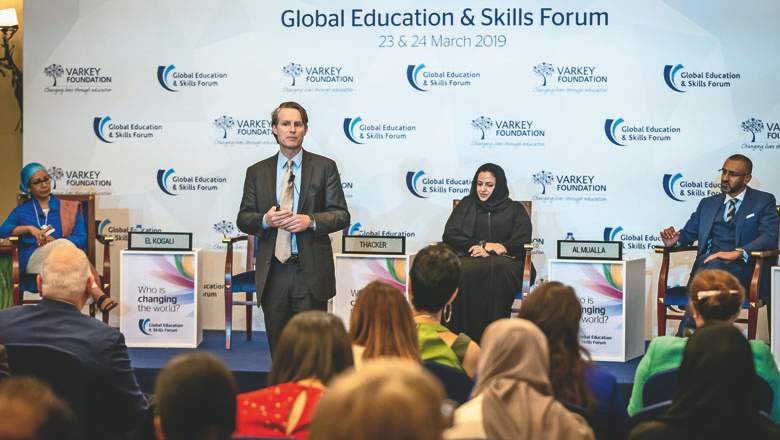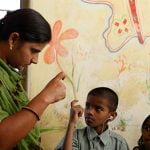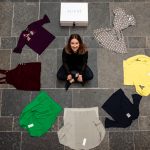
The report highlights how the KHDA has created collaboration among schools through initiatives and projects such as ‘What Works’, ‘Living Arabic’, ‘Lighthouse’ and ‘Abundance’.
Schools collaborating together – instead of solely competing against one another – can help improve the quality of overall education in the emirate, according to a report that was presented at the Global Education and Skills Forum (GESF).
The World Bank, along with the Knowledge and Human Development Authority (KHDA), released the ‘Collaboration Road: Dubai’s Journey towards Improved School Quality’ report in Dubai on Sunday.
The report highlights how the KHDA has created collaboration among schools through initiatives and projects such as ‘What Works’, ‘Living Arabic’, ‘Lighthouse’ and ‘Abundance’. While these have increased teamwork among schools, the World Bank’s online survey showed that 45 per cent of teachers have never participated in these events even though they believed in its advantages.
“In this study, collaboration refers to a central explicit objective for education improvement between or within schools.
“More specifically, collaboration with schools refers to schools working with one another with the aim of school improvement, while collaboration within schools is used to describe teachers working with their peers with the interest of improving teaching and learning,” the report said.
Hind Al Mualla, chief of creativity, happiness and innovation at the KHDA, said there used to be a “serious lack of collaboration” among private schools in Dubai.
“When we look at the collaboration before 2012, we found that there were two schools next to each other for years and they didn’t talk to each other at all.
The only reason they would talk was to organise the parking lot and that was their only reason to collaborate,” she said.
“In 2012, we said, why don’t we bring all schools together? We decided to bring them together for a positive cause to share what ‘s working and what isn’t. When they came, there was brilliant feedback and enthusiasm. We wanted to run one ‘What Works’ in 2012 and we ended up with six and it continued.”
‘What Works’ was launched to bring private schools together so they can share their best practices. The event includes a series of workshops, where teachers give guidance and support to educators from other schools.
The ‘Living Arabic’ initiative, on the other hand, invites Arabic language teachers to a platform where they can discuss how teaching practices can be improved.
The KHDA’s ‘Lighthouse’ project is where principals exchange ideas and ‘Abundance’ is where top-rated schools showcase their knowledge. These initiatives are the only kind that brings educators from different private schools under one roof.
“By promoting collaboration between schools in Dubai, the KHDA is looking to develop network capital. In turn, this increase in capital promotes knowledge transfer across schools and between teachers,” the report said.
A total of 16 schools were surveyed online for the World Bank report. “Despite the willingness among teachers and school leaders, several challenges impede between-school collaborations. For example, 87 per cent of teachers, and 86 per cent of school leaders agreed that lack of time represents a challenge to engage in collaborative initiatives.
“Additionally, 33 per cent of school leaders believe that teachers do not know how to get in touch with other teachers outside their institutions,” the report added.
[“source=khaleejtimes”]








